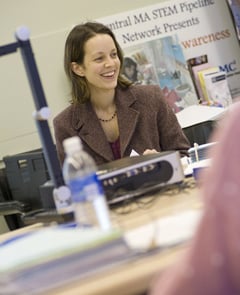
RSRC Math Coordinator Wendy Cleaves discusses different ways to illustrate math problems with K–8 teachers at a MLC training session.
The Mathematics Learning Community (MLC) program developed by the Regional Science Resource Center at UMass Medical School has been accepted for inclusion in the STEMworks! Change the Equation database of programs that deepen young people’s learning in science, technology, engineering and mathematics (STEM).
Created by Change the Equation, a CEO-led initiative that is mobilizing the business community to improve the quality of STEM learning in the United States, the STEMworks! database aims to be a critical resource for funders, program developers and STEM advocates.
A longtime collaborator with Intel Corporation, one of the founders of Change the Equation, the RSRC initially developed and piloted the MLC professional development materials to support a school-based professional learning community for grades K–8 teachers as a component of the Massachusetts Intel Mathematics Initiative. Today, the RSRC continues to provide training and support for the MLC.
“We are honored to have the endorsement of Change the Equation, an important national STEM organization, and look forward to disseminating the MLC professional development program to additional states,” said Sandra Mayrand, director of the RSRC and the STEM Pipeline Network of Central Massachusetts.
Mathematics Learning Communities: What and why?
Helping children master mathematics can be as much a function of how they are taught as what they are taught. Research has shown that creating collaborative teams is a key professional development strategy to help math teachers connect their teaching methods to curriculum content.
Bringing groups of teachers together to brainstorm and compare various instructional approaches in a Mathematics Learning Community (MLC) helps them uncover and explore how students think and learn about specific mathematical concepts. With this deeper understanding of how students perceive and apply a concept, teachers are better able to foster students’ understanding in a classroom setting. The premise is that both teachers and students have insights that can be unlocked and built upon to improve teaching and learning.
In one example of an MLC exercise, a group of teachers create and share diagrams that might help children visually and verbally understand and solve word problems involving multiplication and division of fractions.
“A learning community is an exciting form of job-embedded, ongoing professional development through which teachers increase student learning by working together,” said Wendy Cleaves, MME, MEd, math coordinator for the RSRC. Cleaves is co-developer of the MLC facilitator training program that has been implemented across the commonwealth on behalf of the Massachusetts Department of Elementary and Secondary Education, and has been incorporated into the nationally disseminated Intel Math program.